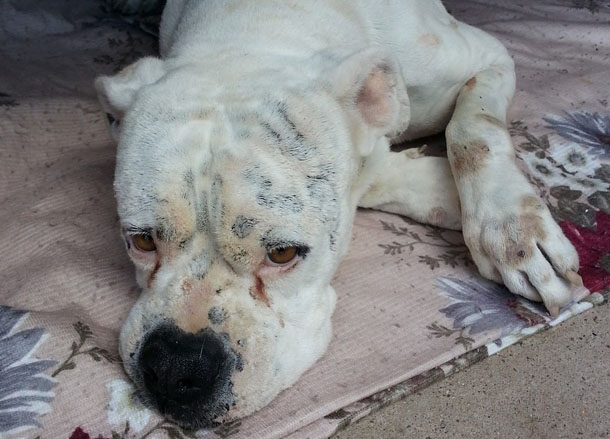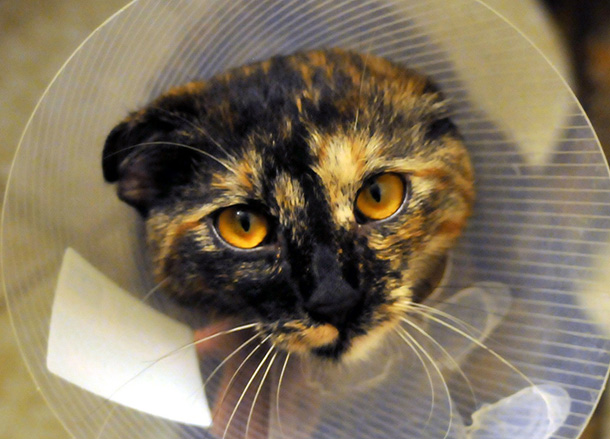Our Blog
Pet Obesity Concerns
Obesity is a major problem for dogs and cats in the United States—in fact October 12 was National Pet Obesity Awareness Day. According to the Association for Pet Obesity Prevention, over 50% of dogs and cats are either overweight or obese. Obesity is often overlooked as a problem by pet owners, but as a veterinarian, I feel it is very important that owners understand the risk factors associated with obesity in their furry family members. Our society has become accustomed to the overweight look. The new “normal” for dogs and cats is overweight. The ideal weight animal is now often viewed as “skinny.” Additionally, with the ever-growing human-animal bond, we are seeing more obesity, since food is often viewed as a form of love. Dogs love treats, and when they give us those little eyes, how can you resist just one more treat?
If you knew what “just one more treat” could do over the years, it may help you resist. There are many risk factors associated with excessive weight in animals. The list includes many of the same risks factors seen in humans: osteoarthritis, diabetes, high blood pressure, heart and respiratory disease, cranial cruciate ligament injury (knee injuries), kidney disease, and decreased life expectancy due to poor quality of life.
I believe that a major problem contributing to pet obesity is pet food companies feeding guidelines. In most cases, pet owners are not purposefully trying to make their animals overweight. They feed according to the guidelines, then they add in treats and dental chews and the occasional table scrap. Dogs and cats don’t need that many calories. When owners are feeding their entire daily caloric need in food, then supplementing treats, this results in weight gain and, ultimately, obesity.
We recommend dogs be fed on a daily caloric need versus based on the feeding guidelines on a bag. We are more than happy to calculate your pet’s daily caloric need based on his/her ideal body weight. We would also be happy to discuss lower calorie food options that may help your little one get to his/her ideal body weight as soon as possible, thus reducing the risk for the many above-mentioned health risks.
Drew Sullivan, DVM, Director
Medical District Veterinary Clinic
Thank You, Vet Techs!
Veterinary technicians are vital to our practice and to the care of your pets. If we were to compare a veterinary technician to a position in the human medicine field, they play a role very similar to a registered nurse (RN). October 16-22 was National Veterinary Technician Week. I would like to let our clients know how much we appreciate all our technicians do for us.
The following is a short list of the many duties they perform: providing client education on wellness care, behavior recommendations, nutritional recommendations, preparing animals for exams or surgery, monitoring animals during surgery, collecting lab samples, running laboratory test, taking X-rays, administering medications and vaccines, and maintaining patient records.
Here at Medical District Veterinary Clinic we are fortunate to have six certified veterinary technicians on staff. Thank you to our amazing team: Candace Crawford, Kelsie Dolezal, Alexandra Garcia, Kyleen Linsemeyer, Crystal Redinger, and Priscilla Wegrzyn. Next time you are in let them know how much you appreciate them—this clinic would not be the same without them. See our profiles of them on our Facebook page.
Drew Sullivan, DVM, Director
Medical District Veterinary Clinic
Heartworm: One Bite, One Infection, That’s Enough
Pet owners share some common misperceptions about the importance of monthly heartworm medications. So here’s a public service announcement that could save your pet’s life.
Heartworm infections have been diagnosed in all 50 states of the United States. Dog-to-dog transmission has been documented in 49 (good job, Alaska). Heartworms are presumed to be rampant in wild canids (such as wolves), which act as a holding tank for the infection.
Every single dog that ever goes outside is at risk for receiving a bite from a mosquito and subsequently is at risk for contracting heartworm disease. This includes tiny little Chihuahuas that never leave their owner’s arms and dogs that just go to the dog park once in a while. One bite, one infection, that’s enough.
Mosquitoes do not generally do their mosquito thing when temperatures reach below 50 degrees F. That being said, with erratic and warming temperatures, we are seeing temperatures often climbing above this threshold even in the late fall months and early spring.
Some clients suggest that they stop medicating their pet in September and begin again in March or April. This is a not an effective strategy. There are often warmer temperatures late in the year, and the mosquitoes do not care what month it is.
Heartworm protection is easy to give and relatively cheap. There are many different brands from which to choose and different rebates offered for bulk buying. If one buys a year’s worth, it generally comes out to about $10 a month. The cost of treating heartworms is substantial (especially with bigger dogs). It would surpass the cost of heartworm preventative for your dog’s whole life. Treatment for heartworm also is long, can be painful, and in some cases can be fatal.
Though some breeds, including collies, are known to have reactions to heartworm medication, the medication is generally safe and without complications for most dogs.
There are some homeopathic, more natural insecticides that can help fend off mosquitoes, but there is not one specifically designed to prevent heartworms. Your dog is at risk without heartworm medication.
So what should you do?
The safest thing to do is to make sure that your dog is on heartworm preventative all year long. If you live in a state, such as California, that doesn’t see heartworm disease very often, but you travel with your dog to environments with the disease, your dog is at risk and should be tested. In fact, every dog should be tested once a year to confirm that heartworm disease is not present.
Also, just a quick note that heartworm can be transmitted to cats (though this is rare) and humans (though this is even rarer). Mostly canids, wild and domestic, are at risk.
If your dog is not current on a heartworm test, or if you need heartworm preventative, or if you have any questions or concerns, let us know.
Brett Grossman, DVM
Medical District Veterinary Clinic
Resident Caterpillars Aid in Monarch Butterfly Conservation
We are excited to introduce you to our two monarch caterpillars on display, Logan and Pilsen! This fall, Veterinary Behavior at Illinois and Medical District Veterinary Clinic at Illinois are teaming up to promote the conservation of one of our favorite insects—the monarch butterfly.
 This captivating insect is not only a beautiful summer guest of Midwestern fields and gardens, it is also an international traveler. Every year several generations of monarchs will reproduce and live their two- to three-month lifespans in the Midwestern U.S. and Canada, and every fall the fifth generation will travel 1,500 miles south to Central Mexico. This migratory generation lives a total of eight to nine months and spends the winter in the pine forests of central Mexico, then travels back to the southern U.S. to reproduce and lay eggs. Their offspring then head further north and the cycle repeats.
This captivating insect is not only a beautiful summer guest of Midwestern fields and gardens, it is also an international traveler. Every year several generations of monarchs will reproduce and live their two- to three-month lifespans in the Midwestern U.S. and Canada, and every fall the fifth generation will travel 1,500 miles south to Central Mexico. This migratory generation lives a total of eight to nine months and spends the winter in the pine forests of central Mexico, then travels back to the southern U.S. to reproduce and lay eggs. Their offspring then head further north and the cycle repeats.
While adult monarch butterflies will feed off of various species of flowers, the monarch caterpillar will only eat one type of plant—the milkweed. Unfortunately, habitat loss due to development and agricultural practices in the U.S. has eliminated large tracts of milkweed and resulted in a decline in the monarch butterfly population. Compounding the problem, deforestation has destroyed several of the monarch’s overwintering sites in Mexico, so fewer butterflies make the journey back to the U.S. to reproduce each spring. Our Midwestern population of monarch butterflies is now severely threatened.
Fortunately, there are many ways we can all help the monarch butterflies:
 Plant the monarch’s host plant, the milkweed. The more milkweed available, the more monarchs will reach adulthood. There are several species of milkweed and attractive options for the home garden are the swamp milkweed, butterfly weed, and whorled milkweed.
Plant the monarch’s host plant, the milkweed. The more milkweed available, the more monarchs will reach adulthood. There are several species of milkweed and attractive options for the home garden are the swamp milkweed, butterfly weed, and whorled milkweed.- Plant nectar plants for adult monarch caterpillars. They need plenty of nectar to reproduce and make their long journey south. Favorites of monarchs include Echinacea, Liatris, and Solidago (Goldenrod).
- Collect and raise monarch caterpillars indoors. While only 1 in 10 eggs will survive to adulthood outdoors due to predation, 9 in 10 eggs raised indoors will survive to adulthood. To successfully raise monarch caterpillars you will need plenty of milkweed, as these caterpillars are hungry! Monarch Watch offers excellent tips to help you get started rearing monarchs.
If you would like to learn more or are interested in visiting our caterpillars, Logan and Pilsen, please stop by our clinic.
Kelly Ballantyne, DVM, DACVB
Veterinary Behavior at Illinois
August 2016 Update on Canine Influenza
In recent weeks, there has been an increased surge of coughing dogs coming into our clinic. We had been free of suspected flu cases for a number of months, here, at Medical District Veterinary Clinic, but three weeks ago, we had one confirmed case followed immediately by multiple other subsequent cases that were highly suspicious of the canine flu.
All of these dogs have had a common history of frequenting day care, boarding facilities, or dog parks. We are still continuing to recommend using caution in these areas to help protect your dog. Additionally, we would like to remind our clients that there is an available vaccine against the H3N2 strain of Canine influenza. It requires two initial doses (two to four weeks apart) and then boostered on a yearly basis.
Most cases have started with either mild coughing or sneezing, which eventually has progressed to a loud, honking cough. Some pets have a decreased appetite, depression, and fever. If your pet is showing any of these signs please have your pet examined as soon as possible—time is of the essence to prevent these cases from progressing to life-threatening pneumonia.
Dogs at the highest risk of exposure include those that socialize with other dogs by attending day care, boarding or grooming, dog parks, and those that live in high density enclosed areas such as high rise buildings. Dogs with high risk of exposure should be vaccinated.
We also recommend owners decrease the risks of exposure by trying to avoid these high-risk areas as much as possible. Canine Influenza Virus can survive 48 hours on hard surfaces and 24 hours on clothing, thus it is very important to also be cautious in elevators, hallways, and places where dogs congregate, like dog relief stations or community dog bowls.
Please call the Medical District Veterinary Clinic at (312) 226-2588 with any questions and to schedule a vaccine appointment.
Thank you,
Drew Sullivan, DVM
Medical District Veterinary Clinic
Canine Influenza Virus Update
It’s been a year since Chicago got caught up in and defeated by the Canine Influenza Virus Apocalypse of 2015. While the collective veterinary world knocks on wood, we can say that there has not been the return we were dreading. However, we are not free from all concerns, so here is a flu review and information on current recommendations.
Before last year, the canine influenza virus (CIV) vaccine protected dogs from the H3N8 strain, which was the only strain circulating in the United States. The cause of the Chicago outbreak of 2015 was identified as a new strain, H3N2, previously seen only in southern China and South Korean dog populations.
Typically CIV cases are not typed by a diagnostic laboratory, but with last year’s outbreak most of the cases that were sent in were identified as the H3N2 strain. Now we don’t have any way to know if the older strain, H3N8, is truly gone or merely overshadowed by the more vibrant and headline-grabbing H3N2.
The most obvious and most-often asked question is: How should you protect your dogs?
If your dogs have previously been vaccinated against H3N8, should they continue to be boostered? Should we add H3N2 to their vaccination protocol in addition to or in place of H3N8? Or if the outbreak is over and not really having much effect on the city, is either vaccination needed?
The absolute safest thing to do if you want to confer the most protection against CIV is to vaccinate your dogs against both strains. The first time dogs are vaccinated against one of the strains, they need a one-time booster after two to three weeks, and then subsequent yearly boosters after that to continue to have protection. That being said, the most recent outbreak seemed to be attributable to the H3N2 strain. Though we can never say that the H3N8 strain is gone, we can say with some certainty that it is much less prevalent. Therefore, your dog is much less at risk for this virus. Many owners are choosing, reasonably, to vaccinate their pets only against the new H3N2 strain.
Other factors that must be considered include your dog’s relative risk of contracting CIV and potential negative side effects of the vaccine. The vaccine is safe, but, as with all vaccines, they should not be administered to animals that are currently sick or immunocompromised in any way. The CIV vaccine is an optional vaccine (sometimes called a “lifestyle vaccine”). If your dog is social and goes to dog parks, the groomer, or doggy daycare, or if your dog has contact with other socially active dogs because you live in an apartment complex with a swinging doggy social scene, these are reasons to choose the vaccination(s).
There are still lots of things we don’t know. Did the anticipated outbreak of 2016 fail to happen because of increased awareness? Herd vaccinations of the Chicago dog population? Unknown natural reasons? Will the virus mutate, as it often does in human flu strains? Will the new H3N2 vaccine be effective, and for how long?
Having your dogs vaccinated doesn’t guarantee that they will be free from sickness, but we can guarantee to help you weigh your dog’s options and needs and support the decision you make.
For more background information about CIV, please refer to the American Veterinary Medical Association FAQ. And please do not hesitate to call us with questions about this or other issues.
Thank you,
Brett Grossman, DVM
Drew Sullivan, DVM
Medical District Veterinary Clinic
Your Pet’s Diet
The temperature is slowly creeping up to Chicago springtime levels, though all Midwesterners knew to brace for that inevitable April snowstorm.
Regardless of your gritty Chicago expectations, we hope you are starting or continuing all your flea and tick medications as well as your heartworm control. You can reference the previous post about this, but remember these are two separate medications that need monthly administration. If you have questions, call or bring in your animal. Also with the season changes come allergens. If your dog or cat is susceptible to allergies, watch carefully, and make sure they are not getting uncomfortable.
This month’s topic—your pet’s diet—is one of utmost importance and one that is too often influenced by non-doctors. Your dog’s and cat’s diet is a huge part of their continual care and health, so it is important to know your options.
This column can’t address every aspect of diet, but it can help you figure out if the diet you are using is right for your pets, specifically.
1. Don’t Go by Price
The cost of a diet does not indicate how effective or healthy it is. There are great diets available from your local grocery store. There are not-so-great diets available from your specialty organic pet store. You cannot let cost be what determines what you feed your pet.
2. Special Diets
The sex, age, and specific metabolic status of your animal are integral factors for determining what it should be eating. If you have three cats and two dogs in your house, there’s a chance that they may all benefit from different types of food. That being said, it is not always possible to feed every animal something different, so you need to make sure that you’re not feeding anything that has negative impacts. Puppy food would not be great for an older dog with kidney disease, and geriatric food for an elderly husky that needs to lose weight would not be healthy for a spry little one-year-old mutt. The same goes for cats.
Special diets have been formulated to address specific health conditions in dogs and cats, including:
- Urinary disease
- Stress
- Skin Allergies
- Kidney disease
- Liver disease
- Heart disease
- General aging
- Weight gain
- Joint inflammation and disease
- Recovery from illness
- Diabetes
- Hyperthyroidism
- Puppies (small) / Puppies (large)
- Hairball control
- Indoor / Neutered
3. Grain-Free Diet / Raw Food Diet
Because people’s passions about these types of diets can be fierce, veterinarians are sometimes hesitant to speak out about them. All owners, though, should know that both of these options may have benefits, directly or indirectly, but they are not all healthy and optimal for ALL patients. Please consult with us before switching to any diet, especially for the sick, for the immunocompromised, and for all puppies or kittens.
Grain-Free: It is rare that animals have grain allergies. It is possible, but rare. The perceived health benefits of a grain free-diet are thought to be tied to the amount of generally lower carbohydrates present. Sometimes the grain filler is replaced with other fillers (some with higher amounts of sugar). There’s never really been any conclusive proof that it helps, though nothing suggests that it hinders anything.
Raw Foods: This is a little more controversial, because raw foods can be dangerous, both to animals and to the humans around them. This is the Centers for Disease Control and Prevention (CDC) bulletin on raw food diets. Please consult with a veterinarian AND your family physician before switching to a raw food diet.
Sometimes, we find that staying put on a diet that works is best. There are times when we hear that someone is happy with how their dog or cat is doing, but is made to feel guilty about their pets’ diet because it isn’t proper. Again, let us help, but we don’t like switching foods without a reason.
Enjoy the season change, and let us know if you have any questions.
Brett Grossman, DVM
Drew Sullivan, DVM
Medical District Veterinary Clinic at Illinois
Spring Forward
Spring is weeks away, and the schizophrenic Chicago weather is starting to settle on the easy months of warmth and sunshine, with occasional rainstorms thrown in for good measure. With the winter relief, though, comes additional burdens on pet owners in the form of allergies.
Often pet owners settle for what they view as unavoidable allergic reactions in the form of skin and ear irritation, respiratory difficulty, lethargy, weakness, gastrointestinal upset, etc. As dogs and cats start to lick, chew, and relieve their itching, we start to see them develop rashes, alopecia, anal sac irritation, and infections. Though April showers decrease the airborne pollen, they also will increase the subsequent pollen produced by plants as well as allow favorable environments for mold and fleas.
Sometimes these initial allergic breakouts can be avoided in anticipation of the season, or at first arrival of clinical signs. Often just simply starting antihistamines and a short course of antibiotics or anti-inflammatories can make a severely uncomfortable animal feel like a spring bunny.
So what can you do? We recommended the following:
- Make sure your dogs are on anti-flea and tick prevention. If your cats go outside or if you have dog housemates that go outside, they should also be on flea medication. Flea allergy dermatitis is a common cause for initiating allergic reactions, and ticks can not only initiate allergic reactions, but also tick-borne illnesses like Lyme disease.
- Act quickly and let us see your cats and dogs before it gets bad. Quick responses make simpler and cheaper treatments. Often a quick exam can lead to immediate relief.
- Spring cleaning: Open the windows (keep the screens on) and air out the house, but keep the animals away when you dust and clean. An allergen storm erupting from your winter dust mite carpet cleaning is enough to cause an allergic landslide.
- Wash off the winter grime from your dog’s coat with an appropriate canine-specific shampoo. There are many types of shampoos to use and we can help you figure out what works best.
- Food allergies are common, but if your pet’s signs tend to come at specific times, like at the season’s change, or whenever it rains, it probably isn’t due to food. Before you spend money on new and sometimes expensive food, please let us know. There may be cheaper and easier ways to deal with this. There are many dogs and cats with actual food allergies, but it’s not always the first rule-out.
- I’m sure your dog loves to swim, even when Lake Michigan is still borderline torturously freezing, but post-lake-swimming ear infections are almost too predictable to not mention. Make sure you dry their ears out and potentially clean them after a nice day at the lake. We can show you how before they get infected.
As always, let us know if you have questions. Dental Month has been extended through March, so if you missed out, it’s not too late to take advantage of our discounted dentals.
Brett Grossman, DVM
Medical District Veterinary Clinic at Illinois
Teeth and Beyond
February is quite a month for potential celebration. Even if you limit yourself to going all out only for all those obligatory National Dog Training Month and National Spay/Neuter Awareness Month parties, then you will probably end up stretching yourself thin for the Barley Month, National Pancake Week, National Pizza Day, and Texas Cowboy Poetry Week hoopla. It can get quite exhausting.
But before you cash it in for the month, remember that it’s also National Pet Dental Health Month, and we are celebrating at the Medical District Veterinary Clinic at Illinois by giving you 10% off of all dental procedures (15% for UIC students and employees). Due to client demand, we are extending the discount throughout March. Call us today at (312) 226-2588 to reserve your appointment!
This is both a great time to take advantage of randomly assigned national holidays and also to review the benefits of good dental health.
- One cannot put a price on eliminating your otherwise beautiful and perfect pet’s malodorous breath. Think of all the family gatherings made even more special by not having to try to find the source of the rotting fish smell.
- There can be a great deal of pain and irritation associated with inflamed gums, gingivitis, or teeth infections. Relieving your pets of these problems may help them enjoy eating again, and enjoy their life in general.
- Addressing tooth and gum infections stops the infection from spreading deep into the mouth and even to other internal organs like the heart, kidneys, and liver. Early detection and treatment not only saves your pet from more severe and damaging disease, but also will save you the expense of treating these more serious health problems that could arise if dental health is ignored.
- After a good cleaning is a good time to introduce regular brushing and dental care to prevent plaque buildup. It is generally more difficult–to borderline-impossible–to start a brushing routine when there is substantial plaque and tartar buildup.
- Though there is always risk with anesthesia, complications are rare with healthy dogs. Perhaps it is time to have your animals’ teeth cleaned while they are still happy and healthy, rather than waiting for a variable to complicate their anesthesia risks.
We are happy to discuss the specifics of your pets’ needs at any time as well as give you a very specific cost estimate for what is needed. Just let us know. Don’t let all the Groundhog Day and National Pistachio Day enthusiasts steal the February thunder. Discuss dental health instead.
Thanks,
Brett Grossman, DVM
Drew Sullivan, DVM
Medical District Veterinary Clinic at Illinois
Neuter and Spay, That’s the Way
You probably either know (or are sick of hearing) why you should have your pets spayed and neutered. February is Medical District Veterinary Clinic’s annual Spay and Neuter Month (as well as Dental Month) with significant discounts offered next month to make this process easier for you. Despite that amazingly enthralling introduction, I think it’s time you hear it all again.
Here’s the abbreviated list of what you should know:
- Neutered/Spayed animals will live significantly longer than intact animals.
- Neutered/Spayed animals will have significantly fewer health problems during their lifetime. We see things like cancer (mammary gland, testicular, ovarian, uterine, etc.), infections, and inflammatory issues more frequently in intact animals.
- Intact animals (non-spayed or neutered) can have real live babies. I know this is shocking to some, but if you have two intact animals who can, they will become romantically coupled and have a herd of kittens or puppies, even if you don’t think they will, even if they are related, or even if you swear you are going to keep them apart. Pregnant dogs and cats need extra care and potentially surgical intervention, which can be expensive and dangerous. Kittens and puppies take a lot of time to care for and the shelters of Chicago are already inundated with kittens and puppies from dogs and cats in similar situations.
- Intact animals try to get out of the house and escape the yard for roaming the neighborhood. They will also participate in mounting and marking behavior.
Here’s what we often hear as reasons why people don’t have their animals spayed or neutered:
- Perhaps you signed a restrictive contract with your breeder that you wouldn’t have it done or wouldn’t have it done until later. You may want to investigate whether this is legal. Also think about from whom you would ask questions about your own health—your doctor, or someone who is not your doctor?
- Fido/Trixie is already six years old, so there’s no real reason to do it at this point. This just is not true. Neutering/Spaying is still beneficial because of the aforementioned reasons.
- We often hear that owners would like to have their animals experience the lovely and natural act of love and having a baby. I would firstly advise all of you who are males to ask a female who has had a baby how wonderful the experience was, and secondly, have you ever seen cats and dogs in heat that are not in a scripted romantic comedy? It is not pretty. It involves discomfort, pain, anxiety, and often lots of unwanted fluid secretion. I would also ask you think about how animals view their experiences and how similar it is to our experiences as human. We all know that animals feel a great deal, but how they feel things like “love” and “family” is much different. We have domesticated our animals and they are not in the wild. Reproduction is not necessary and though I cannot tell you, exactly, it may not even be enjoyable. Please google pictures of a cat penis if you want to imagine the joys of feline reproduction. Also there is much data and research on the health benefits of dogs that are spayed before their first heat cycles in comparison to those that have even one.
- We also often hear that an owner was told that anesthesia is dangerous and animals can die while under it. At last look, the international statistics regarding anesthesia in pet dogs and cats is 99.85% success. And this also includes emergency anesthesia, anesthesia on known sick or critical patients, and non-monitored anesthesia without the aid of doctors or certified veterinary technicians. We take great care in watching out for our patients with pre-anesthetic blood work and continual monitoring of all monitors. There is ALWAYS a risk with anesthesia, as there is with human medicine, as well. But there is greater likelihood of secondary diseases from keeping your animals intact than from anesthesia. We, of course, can talk to you at length about your specific animal and decide what is best.
Every patient is different and requires medical decisions that are best for them, and that doesn’t ALWAYS include spaying/neutering. We just want to make sure that you are making those decisions for the correct reasons. If you have questions, let us know. If you don’t have questions, you can also let us know. We would love to hear from you.
February is also dental month, so next month we will have a dental manifesto for your entertainment.
Thank you,
Brett Grossman, DVM
Medical District Veterinary Clinic at Illinois










